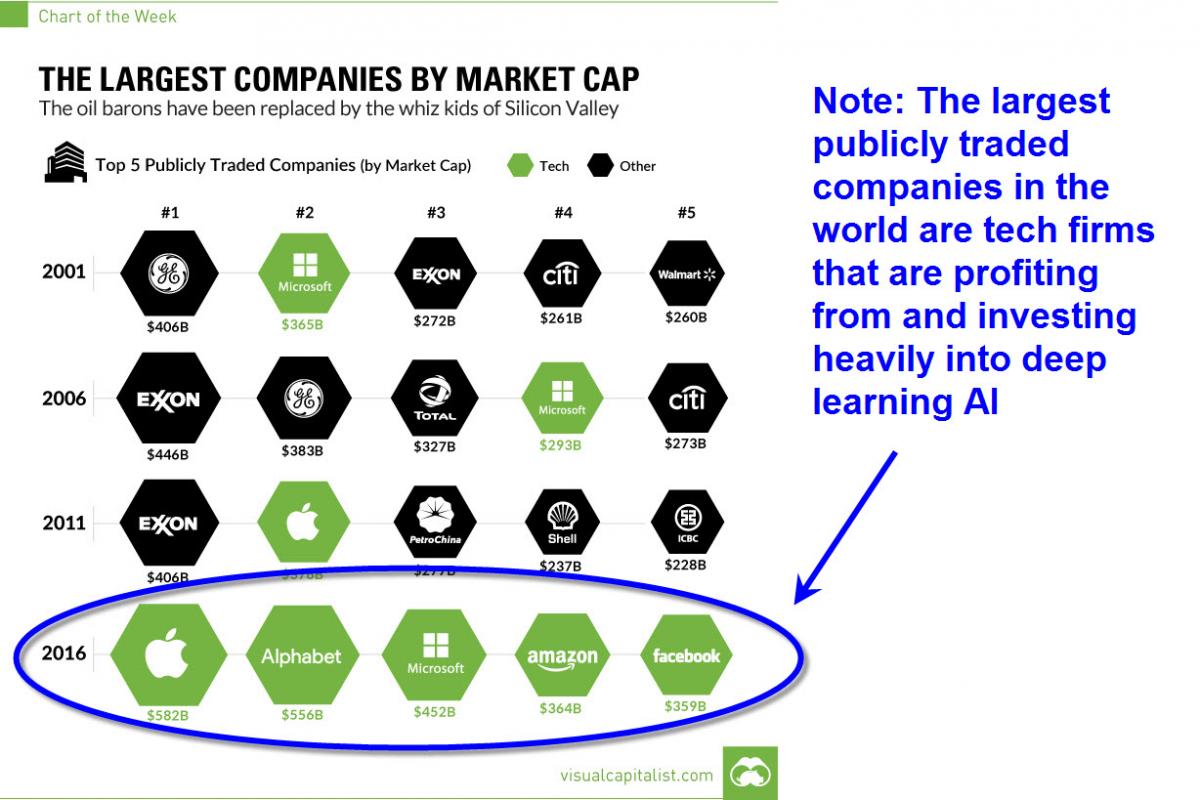The following is a summary of our recent FS Insider podcast, which can be accessed on our site here.
Google, Apple, Facebook, Amazon, and Microsoft—the largest publicly traded companies in the world—are banking their collective futures on the game-changing field of deep learning artificial intelligence.
“They have entire research arms dedicated to unlocking as much value out of deep learning as they possibly can,” Nikhil Buduma told FS Insider.
Nikhil Buduma is an MIT grad and the author of Fundamentals of Deep Learning: Designing Next-Generation Machine Intelligence Algorithms.
“We’re still not yet there in replicating human-level intelligence,” Buduma said. “But, there’s clearly a massive step function that’s been unlocked with [deep learning].”
Listen to the following clip:
Deep learning—a subfield of machine learning—differs from traditional AI because it is modeled after the neural architecture of the human brain and allows machines to learn for themselves, as humans do.
With traditional AI, a programmer fed a computer a series of rules and, while the smart machines could perform similar to or greater than humans in very isolated tasks, their performance was limited in more complex, "fuzzy" environments like human language.
So what is deep learning exactly and what makes it different?
With deep learning, programmers connect digital “neural networks” in a way that models the human brain’s network of neurons. Traditional machine learning only computes on a single layer of inputs where deep learning can operate on multiple layers, allowing the system to mine more data at once and perform functions similar to what the brain can do. In short, deep learning brings us another step closer to the architecture and intelligence capabilities of the human brain.
When stacked together in parallel, deep learning “neurons” suddenly develop the ability to “think,” or at least function in a way that resembles thought, essentially “teaching computers to do what our brains can do naturally,” Buduma added.
“Deep learning models are capable of learning to focus on the right features by themselves, requiring little guidance from the programmer,” Buduma said. He believes present research is about “5-10 years closer to expressing human-like intelligence.”
For example, Apple’s virtual assistant Siri already functions as a limited AI app that transcends a simple voice-recognition solution. Buduma predicts programs like Siri will someday become more like a human friend, offering advice and meaningful insights to help the user solve complicated, personal problems.
Google, specifically its R&D umbrella firm Alphabet, may well be the heaviest investor in the deep learning disruption. In 2014, Google acquired artificial intelligence company DeepMind, signaling its first nimble steps into the deeper AI waters.
In 2012, one of the company’s AI-fueled, self-driving cars passed a Nevada state driver’s test. More recently, millions of viewers fell in love with a video depicting a pair of chatbots holding lively, and often weird, debates and discussion via a set of modified Google Home speakers.
“Google has taken an active approach to injecting every single one of their products with artificial intelligence capabilities,” Buduma said.
“Part of the reason is they understand intimately that the future of tech—and very likely the future of every single sector—very much lies in their ability to apply artificial intelligence to unlock incredible amounts of efficiency.”
Listen to this full 2-part interview on our website by logging in and clicking here. Become a subscriber and gain full access to our premium podcast interviews with leading guest experts by clicking here.






